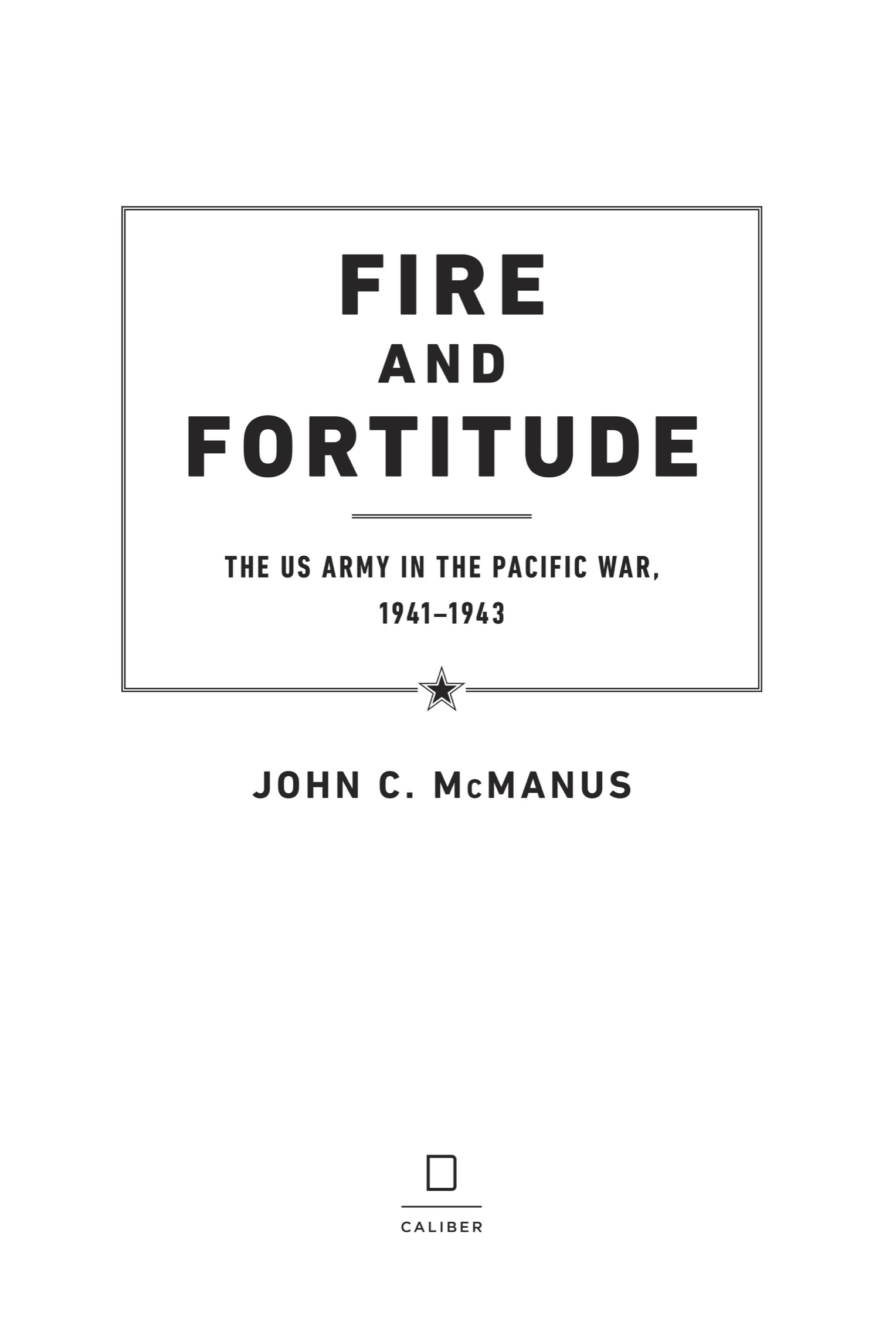Praise for Fire and Fortitude
This eloquent and powerful narrative is military history written the way it should be. John C. McManus has seamlessly blended the strategic and tactical story with deep analysis of the political context and social composition of armies that embodied the cultures of the nations from which they were formed. During the two years covered by this book, American forces in the Pacific theater transitioned from fighting on a shoestring defensive to the beginning of mighty offensives that would prove irreversible.
James M. McPherson, Pulitzer Prizewinning author of Battle Cry of Freedom
From the burning waters of Pearl Harbor to the sweltering jungles of Guadalcanal and the icy shores of Alaskas Aleutian Islands, Fire and Fortitude is a heart-pounding journey through the tragedies and the triumphs of the Pacific. Historian John C. McManus, armed with an incredible eye for detail and the deft touch of a novelist, has crafted one of the finest epics of World War II.
James M. Scott, Pulitzer Prize finalist and author of Target Tokyo and Rampage
A very fine account of war in the Pacific founded on wide research and excellent judgment.
Antony Beevor, New York Times bestselling author of D-Day: The Battle for Normandy and Ardennes 1944: The Battle of the Bulge
John McManus, one of Americas great historians, has written a masterpiece. From the red light district in Honolulu just hours before the attack on Pearl Harbor to the nearly forgotten assault on fiercely defended Makin Island, Fire and Fortitude is a long-overdue saga of the US Armys punishing fight in the Pacific. McManus brilliantly transports the reader back in time, offering new information and dazzling analysis in this groundbreaking narrative.
Patrick K. ODonnell, author of The Unknowns: The Untold Story of Americas Unknown Soldier and WWIs Most Decorated Heroes Who Brought Him Home
In this compelling narrative, John McManus does for the US Army in the Pacific what Rick Atkinson did for the Army in Europe: chronicle its growth and transformation from a small, insular, pre-war constabulary into an enormous and efficient fighting machine. In the process he deftly profiles the leaders and captures all of the human drama of the Pacific War.
Craig L. Symonds, Lincoln Prizewinning author of World War II at Sea
Army ground troops constituted by far the largest element of American military forces arrayed against Japan in the Pacific War, yet their efforts have been overshadowed in the popular American memory by the achievements of the Marines and the Navy. John C. McManuss exhaustively researched and highly readable book goes far to redress the balance. In many ways his treatment of the Army in the war against Japan may well be compared to Rick Atkinsons work on the Army in the European theater.
Ronald Spector, author of Eagle Against the Sun: The American War with Japan
ALSO BY JOHN C. M C MANUS
Hell Before Their Very Eyes: American Soldiers Liberate Concentration Camps in Germany, April 1945
The Dead and Those About to Die: D-Day: The Big Red One at Omaha Beach
September Hope: The American Side of a Bridge Too Far
Grunts: Inside the American Infantry Combat Experience, World War II Through Iraq
American Courage, American Carnage: The 7th Infantry Regiments Combat Experience, 1812 Through World War II
The 7th Infantry Regiment: Combat in the Age of Terror, the Korean War Through the Present
U.S. Military History for Dummies
Alamo in the Ardennes: The Untold Story of the American Soldiers Who Made the Defense of Bastogne Possible
The Americans at Normandy: The Summer of 1944The American War from the Normandy Beaches to Falaise
The Americans at D-Day: The American Experience at the Normandy Invasion
Deadly Sky: The American Combat Airman in World War II
The Deadly Brotherhood: The American Combat Soldier in World War II
An imprint of Penguin Random House LLC
penguinrandomhouse.com

Copyright 2019 by John C. McManus
Maps 2019 by Rick Britton
Penguin supports copyright. Copyright fuels creativity, encourages diverse voices, promotes free speech, and creates a vibrant culture. Thank you for buying an authorized edition of this book and for complying with copyright laws by not reproducing, scanning, or distributing any part of it in any form without permission. You are supporting writers and allowing Penguin to continue to publish books for every reader.
DUTTON CALIBER and the D colophon are registered trademarks of Penguin Random House LLC.
LIBRARY OF CONGRESS CATALOGING-IN-PUBLICATION DATA
Names: McManus, John C., 1965 author.
Title: Fire and fortitude: the US Army in the Pacific War, 19411943 / John C. McManus.
Other titles: US Army in the Pacific War, 19411943
Description: First edition. | New York, New York: Dutton Caliber, an imprint
of Penguin Random House LLC, [2019] | Includes bibliographical references and index.
Identifiers: LCCN 2018037343| ISBN 9780451475046 (hardcover) |
ISBN 9780698192768 (ebook)
Subjects: LCSH: World War, 1939-1945CampaignsPacific Area. | United States.
ArmyHistoryWorld War, 19391945.
Classification: LCC D767 .M36 2019 | DDC 940.54/26dc23 LC record available at
https://lccn.loc.gov/2018037343
While the author has made every effort to provide accurate telephone numbers, internet addresses, and other contact information at the time of publication, neither the publisher nor the author assumes any responsibility for errors or for changes that occur after publication. Further, the publisher does not have any control over and does not assume any responsibility for author or third-party websites or their content.
Version_1
To Nancy, with all my love.
To my incredible parents, Michael and Mary Jane McManus, and to Ruth and Nelson, who have treated me as their son.
Contents
Authors Note
Most Pacific theater events and operations took place on the other side of the international date line from North America. Thus, all dates and times in this series are local to the action.
To avoid confusion between morning and afternoon times, this book employs the twenty-four-hour military clock. For instance, 8:00 A.M. is 0800; 2:00 P.M. is 1400, and so on.
In the Japanese and Chinese languages, surnames are listed before given names, e.g., Tj Hideki rather than Hideki Tj. This is the exact opposite of Western practice. Because this is a work written in the English language, Japanese and Chinese names will be listed in the Western style, except with individuals, like Chiang Kai-shek or Mao Zedong, whose names are widely known in their correct cultural format.
The terms Jap and Nip are largely viewed today as racist and offensive. During World War II, however, they were used so commonly among Americans, Australians, and Britonseven generals and policy makersas to take on the status of mundane slang. As such, I will make no attempt to excise the terms from this volume. In no way does this indicate my acceptance or approval of these pejorative words.

